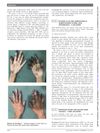 October 2023 in “International Journal of Science and Research (IJSR)”
October 2023 in “International Journal of Science and Research (IJSR)” Early diagnosis of GLPLS is crucial to prevent complications, but scarring alopecia is irreversible.
 September 2023 in “Clinical, cosmetic and investigational dermatology”
September 2023 in “Clinical, cosmetic and investigational dermatology” A patient with a rare form of lupus improved after treatment for skin ulcers and hair loss on the face and scalp.
 August 2023 in “GLOBAL JOURNAL FOR RESEARCH ANALYSIS”
August 2023 in “GLOBAL JOURNAL FOR RESEARCH ANALYSIS” Effective hair loss treatment requires personalized approaches and patient-provider collaboration.
 July 2023 in “Skin Research and Technology”
July 2023 in “Skin Research and Technology” Baricitinib combined with other immune therapies may safely and effectively treat severe scalp hair loss.
 July 2023 in “IntechOpen eBooks”
July 2023 in “IntechOpen eBooks” New treatments for alopecia areata show promise, but more research is needed to confirm their effectiveness.
 July 2023 in “IntechOpen eBooks”
July 2023 in “IntechOpen eBooks” Some types of hair loss can be reversed, others are permanent, and treatments vary by type.
 July 2023 in “GLOBAL JOURNAL FOR RESEARCH ANALYSIS”
July 2023 in “GLOBAL JOURNAL FOR RESEARCH ANALYSIS” The new treatment showed promise in managing eyebrow hair loss.
 July 2023 in “The Egyptian Journal of Hospital Medicine ”
July 2023 in “The Egyptian Journal of Hospital Medicine ” The conclusion is that emotional support and a variety of treatments are important for alopecia areata, but more research is needed.

Psychosis can be an early sign of neuropsychiatric lupus, treatable with tailored medication.
 June 2023 in “Dermatology online journal”
June 2023 in “Dermatology online journal” A person with thyroid problems had rare, swollen, bald spots on their scalp caused by a condition usually found on the shins.
 May 2023 in “Journal of managed care & specialty pharmacy”
May 2023 in “Journal of managed care & specialty pharmacy” Alopecia areata causes hair loss and life quality issues; current treatments are often unsatisfactory, but new drugs like JAK inhibitors show promise.

The conclusion is that dermatologists need to improve prescription practices to reduce errors and drug interaction risks.
 April 2023 in “The journal of investigative dermatology/Journal of investigative dermatology”
April 2023 in “The journal of investigative dermatology/Journal of investigative dermatology” Too much IKZF1 and Ikaros protein may cause alopecia areata.
 April 2023 in “Journal of Investigative Dermatology”
April 2023 in “Journal of Investigative Dermatology” Some patients who had a severe drug reaction developed long-term hair loss.
 April 2023 in “IP Indian journal of clinical and experimental dermatology”
April 2023 in “IP Indian journal of clinical and experimental dermatology” Lichen planus is a chronic autoimmune disease that is hard to treat and more common in women.
 April 2023 in “Revista colombiana de reumatología”
April 2023 in “Revista colombiana de reumatología” JAK inhibitors like tofacitinib can effectively treat severe alopecia areata.
March 2023 in “Authorea (Authorea)” Early diagnosis and treatment of systemic-onset juvenile idiopathic arthritis are crucial for improvement.
 March 2023 in “JAAD case reports”
March 2023 in “JAAD case reports” Botulinum toxin A may be an effective alternative treatment for the scalp disorder folliculitis decalvans.
 March 2023 in “European journal of internal medicine”
March 2023 in “European journal of internal medicine” The patient's long-term symptoms were due to Sheehan's syndrome, which improved with hormone therapy.
 January 2023 in “Rossijskij žurnal kožnyh i veneričeskih boleznej”
January 2023 in “Rossijskij žurnal kožnyh i veneričeskih boleznej” New treatments for child hair loss due to immune issues are effective but not yet officially approved.
 January 2023 in “Indian dermatology online journal”
January 2023 in “Indian dermatology online journal” Skin problems after waxing led to a sarcoidosis diagnosis.
 December 2022 in “International Journal of Women's Dermatology”
December 2022 in “International Journal of Women's Dermatology” The Sinclair Shedding Scale is effective for diagnosing Alopecia Areata Incognita and monitoring treatment success.
 October 2022 in “Portuguese journal of dermatology and venereology”
October 2022 in “Portuguese journal of dermatology and venereology” The best concentration of triamcinolone acetonide for treating alopecia areata is still unclear.
 October 2022 in “International Research Journal of Modernization in Engineering Technology and Science”
October 2022 in “International Research Journal of Modernization in Engineering Technology and Science” COVID-19 vaccines may cause hair loss in people who are genetically prone to it.
 September 2022 in “Intisasi sains media”
September 2022 in “Intisasi sains media” A young child with complete hair loss improved significantly with a combination of hair growth treatments and laser therapy.

Hair loss can be caused by hormones, illness, autoimmune disorders, or vitamin deficiencies, and treatments vary depending on the type.
 July 2022 in “The journal of investigative dermatology/Journal of investigative dermatology”
July 2022 in “The journal of investigative dermatology/Journal of investigative dermatology” Early diagnosis and treatment of hair loss in hijab-wearing women are crucial to prevent permanent damage and improve quality of life.
 July 2022 in “medRxiv (Cold Spring Harbor Laboratory)”
July 2022 in “medRxiv (Cold Spring Harbor Laboratory)” Satoyoshi syndrome is likely an autoimmune disease that mainly affects young women and improves with immune-related treatments.

COVID-19 may lead to severe skin necrosis without clear underlying causes, as seen in a diabetic patient who required leg amputation.
 May 2022 in “Liver transplantation”
May 2022 in “Liver transplantation” The document explains how the immune system reacts to organ transplants and the treatments used to prevent rejection.





























